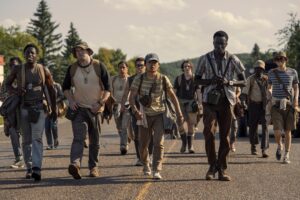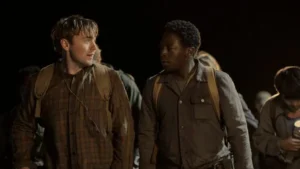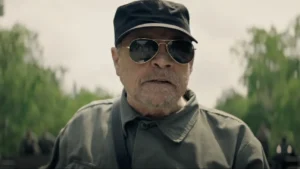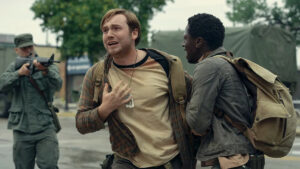Publication Date: 09-15-2025
The Long Walk (2025) review
Dir. Francis Lawrence
By: Steve Pulaski
Rating: ★★★½
You could be forgiven if you weren’t aware that The Long Walk, which has been explicitly advertised on TV and in theaters for the last couple of weeks, was an adaptation of a Stephen King novel. I, myself, hadn’t heard of it, and assumed it was a new work; perhaps a novella in one of his anthology books. In fact, The Long Walk was the first novel King wrote, all the way back in 1966-67 when he was a freshman at the University of Maine. It wasn’t published until 1979. For all the dystopian hellscape novels I had to read in grade school, I’m now a bit upset with my school district for choosing to micro-analyze Lois Lowry’s The Giver over this fascinating piece of work.
After numerous start-stops in production — at one point, a film adaptation of King’s first book was to be directed by George A. Romero, and another was to be helmed by Frank Darabont, who directed The Green Mile and The Mist — The Long Walk storms into theaters with an argument to be made that it’s one of the best King adaptations since It: Chapter One. It’s a lean, mean picture predicated on dialog as well as literary and literal forward-motion. This is a movie that keeps moving, arresting you with its character development, oppressive bleakness, and very real, almost immediate consequences for those who chose to embark on the titular challenge.

America has devolved into financial destitution. It’s a totalitarian hellhole run by a strong-armed commander known as “The Major” (a gruff Mark Hamill), who we are told in conversation has outlawed media in the form of music and books. What’s left is a morosely miserable, virtually uninhabitable country: one that “celebrates” an annual event called “The Long Walk.”
50 young men, one from each state, compete in a walk that has no finish-line. It ends when only one participant remains. The rules are straightforward. The men must walk at a pace of three miles-per-hour. Multiple drops below that speed result in the participant being executed by the military. Stepping off the road means immediate execution. Defying or assaulting the military officials overseeing this nationally televised endurance test also results in being killed. The winner receives a wish that can be granted as well as an indeterminant sum of money. Cameras are ubiquitous, but writer JT Mollner (Strange Darling) doesn’t abandon the walkers and drop us in the homes of television viewers. We are metaphorically walking with them, and we see most of their executions in explicit detail.
The cast is assembled of faces that will be familiar to few, but should be remembered from here-on-out. Our main character is Ray Garraty, played by Cooper Hoffman of Licorice Pizza fame. Garraty’s relationship with his late father is the motivation for him to walk, and that subtext likely attracted Hoffman, who lost his dad, Philip Seymour, in such a tragic manner when he was only 10-years-old. Almost immediately, Garraty bonds with Peter McVries, played by the boundlessly charismatic David Jonsson, who shined in Rye Lane. Hoffman and Jonsson have exquisite chemistry, whether they are casually bantering, trying to motivate one another, or even, if only for a few moments, at each other’s throats.

Other walks are the hostile and despondent Stebbins (Garrett Wareing); your typical asshole bully Barkovitch (Charlie Plummer); and two others in Arthur Baker (Tut Nyout) and Hank Olson (Ben Wang), who round out Garraty and McVries’ “Musketeers” quartet. The walk, which goes on for hundreds of miles, is punctuated by the occasional sermon from the Major himself, and infrequent appearances of Garraty’s mother, Judy Greer, who is liable to break your heart every time she appears. Momma’s boys will understand.
On a practical level, the film of course addresses the predictable ways in which someone’s walk could be derailed: lack of sleep, adequate food/water (rations are provided by the military), how someone is basically forced to urinate and/or defecate while walking, sickness from excessive exposure to the elements, etc. However, the real focus for Mollner and director Francis Lawrence (the Hunger Games series) is on the young men themselves and how the walk forces them to confront their traumas in a group setting. The kids, specifically Garraty and McVries, seem to do this as a way to distract from the fact that they very well be one of 49 Dead Men Walking, and the only thing that could absolve them from the misery in which they reside is a blast to the head. In some ways, the banter of this ramshackle bunch of individuals reminded me a lot of The Outsiders. It carries a similar kind of raw energy along with highlighting variously forms of masculinity in a human manner.

Most of the young men who are afforded significant dialog leave an impression. Ben Wang, who was one of the few bright spots in this year’s Karate Kid: Legends, enters the walk as a source of comic relief, but after about a hundred miles of activity, the humor, like most of his energy, has left his body. One quietly remarkable note about Mollner’s script is how he makes the deaths of characters you despise early and often something to mourn. In a movie like this, Battle Royale, or even The Belko Experiment, where you know from the jump there will be a very high body-count, there could be a sick part of you that wants to see a character you dislike bite the dust. You think you’ll be satisfied when it happens, and often times you are. In The Long Walk, the subdued tone and progressively mournful nature of the story makes even the deaths of initially loathsome characters something deeply saddening. Not an easy feat, but appropriate for a film as caustic as this one.
The great critic Sean Fennessey beat me to the punch on this observation, but I assume many more will have it. How lucky are we to witness the quick ascension of talents like Cooper Hoffman and David Jonsson, with confidence that they will be anchoring great films for several decades to come? Here’s hoping that future films with both parties continue to double down on giving them (relatively) thin plots and complex characters that further establishes what makes them some of the best young actors at the moment.
Starring: Cooper Hoffman, David Jonsson, Garrett Wareing, Tut Nyuot, Charlie Plummer, Ben Wang, Roman Griffin Davis, Josh Hamilton, Judy Greer, and Mark Hamill. Directed by: Francis Lawrence.
About Steve Pulaski
Steve Pulaski has been reviewing movies since 2009 for a barrage of different outlets. He graduated North Central College in 2018 and currently works as an on-air radio personality. He also hosts a weekly movie podcast called "Sleepless with Steve," dedicated to film and the film industry, on his YouTube channel. In addition to writing, he's a die-hard Chicago Bears fan and has two cats, appropriately named Siskel and Ebert!


